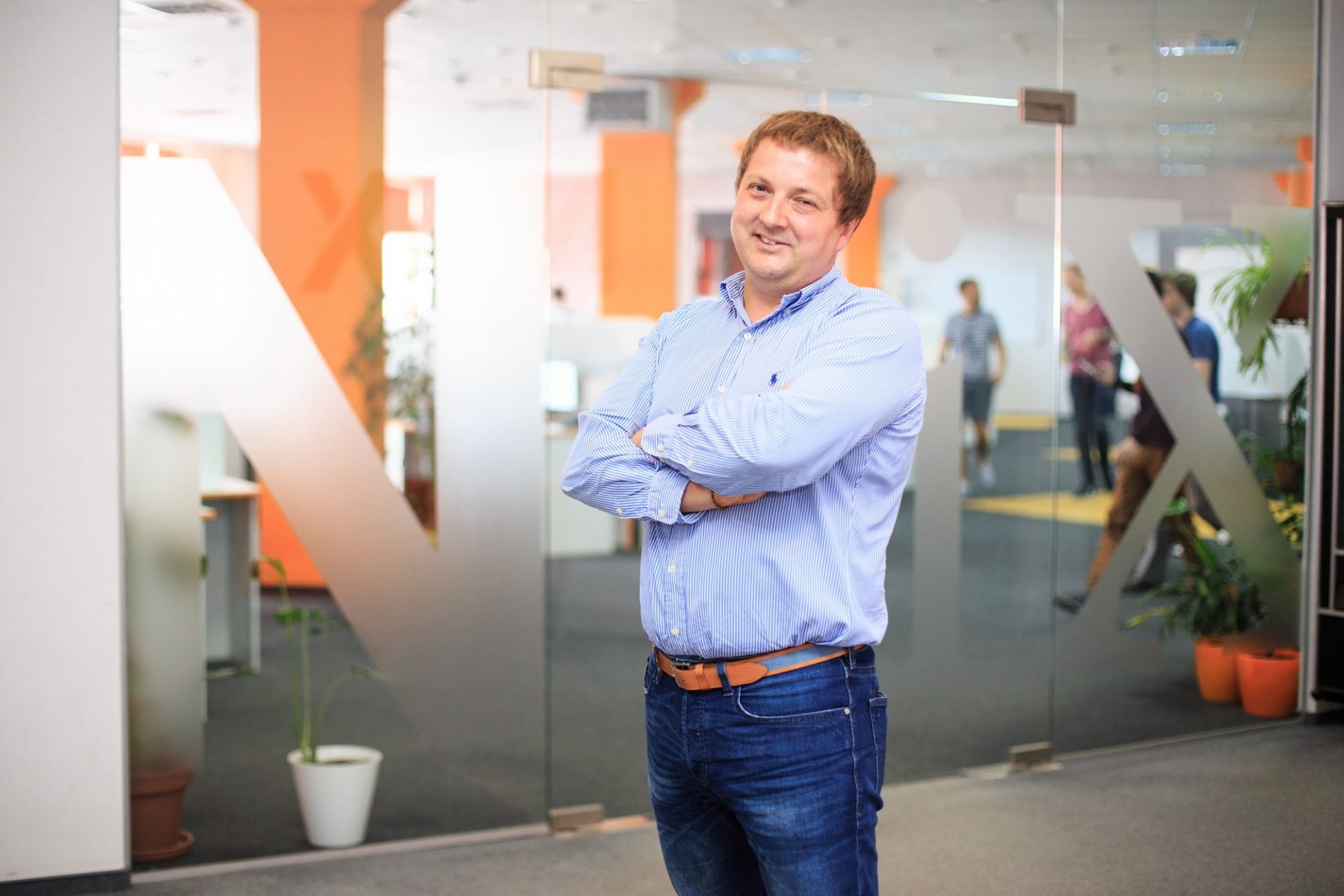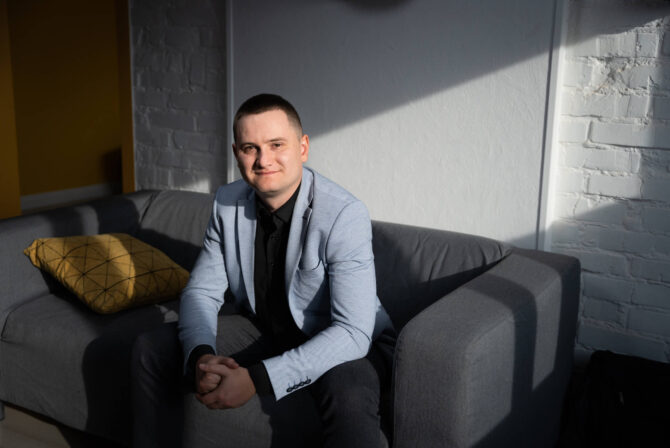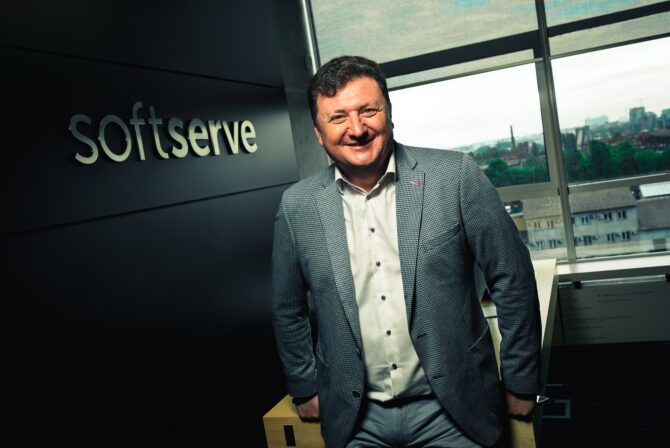«Технологія успіху» — серія розмов із керівниками найамбіційніших ІТ-компаній країни. Впродовж року — разом із Lviv IT Cluster — ми розповідатимемо про підприємців, які є лідерами технологічних компаній України, та спробуємо краще зрозуміти людей, які рухають країну вперед.
Андрій Павлів, CEO N-iX та голова наглядової ради Львівського ІТ Кластера, розповів про історію й етапи розвитку N-iX, важливість win-win та об’єднань, а також бажання вивести компанію на IPO.
Please check the link below to read the article in English — Andrew Pavliv, N-iX.
Як ви стали тим, ким ви є зараз?
Колись намагався аналізувати, як і чому саме так все склалося. Дійшов висновку, що в житті у мене було декілька важливих моментів, які мене сформували.
Я народився у Львові в родині інженерів. Інженерами були і моя бабуся, і діди, і батьки. Тато мав справу з автомобілями, мама — із теплотехнікою.
Коли ти ростеш у сім’ї інженерів, то дуже багато чуєш про engineering, автомобілі, технології та розумієш, що бути інженером — це круто. Незважаючи на те, що в Радянському Союзі все не було дуже круто. Але це точно перша важлива точка.
Друга — це те, що мій дідусь керував підрозділом спеціальних розробок у Головному спеціалізованому конструкторському бюро «Автонавантажувач». Вони робили різноманітні підйомні автомобілі та гідравлічні конструкції. В тому числі й космічні — наприклад, розробляли місяцехід. Львів у період Радянського Союзу був великим інженерним центром, можливо, навіть одним із ключових. Місцеві дослідницькі інституції дуже цінувалися.
Пригадую, як у дитинстві часто приходив до нього на роботу. Він показував, який вигляд мають машини і як працюють інженери. Наприклад, вже у 2 класі я знав, що таке пульман.
Свого часу батькам довелося поїхати у Болгарію. Їхня робота була пов’язана із експортом автонавантажувачів. Відтак, я дуже багато часу проводив із дідусем, а на літо їздив у Болгарію до батьків. Там багато часу проводив у консульстві й спілкувався з дипломатами.
Вже зараз розумію, що ці дві речі — розуміння інженерії та вільне спілкування з іноземцями — дали мені той хороший поштовх, завдяки якому мені зараз легко будувати бізнес з іноземцями
Вже зараз розумію, що ці дві речі — розуміння інженерії та вільне спілкування з іноземцями — дали мені той хороший поштовх, завдяки якому мені зараз легко будувати бізнес з іноземцями. Не було жодного бар’єра, і мені завжди було легко спілкуватися.
Інший важливий момент пов’язаний зі школою. Я навчався у математичній школі №11. У нас була дуже хороша вчителька математики. Вона не лише мотивувала нас до навчання, а й намагалася виховати в нас ті риси характеру, які потрібні для досягнення успіху. Як на мене, це було важливо.
Я хотів вступати на економічні або бізнесові спеціальності, але був ще один важливий момент. З огляду на те, що я закінчував математичну школу, мені було легко вступити на прикладну математику і складніше на економіку — там був великий конкурс. Батьки тоді не могли мені ніяк допомогти.
Тоді я так і не вступив на бажану спеціальність, але зараз розумію, що все склалося якнайкраще. Дуже класно, що я отримав прикладну освіту, яка пов’язана з математикою і програмуванням, а не якусь загальну спеціальність, єдиний вихід після якої — продавати побутову техніку в магазинах. Якщо згадувати студентські роки, то це важливий milestone.
Крім того, я завжди був підприємцем. Перше своє маленьке підприємство я побудував у 2 класі. Колись популярними були маленькі паперові автомобілі із крилом позаду. Можна було дути у крило і таким чином змагатися з однокласниками на швидкість. Ми їх робили та продавали.
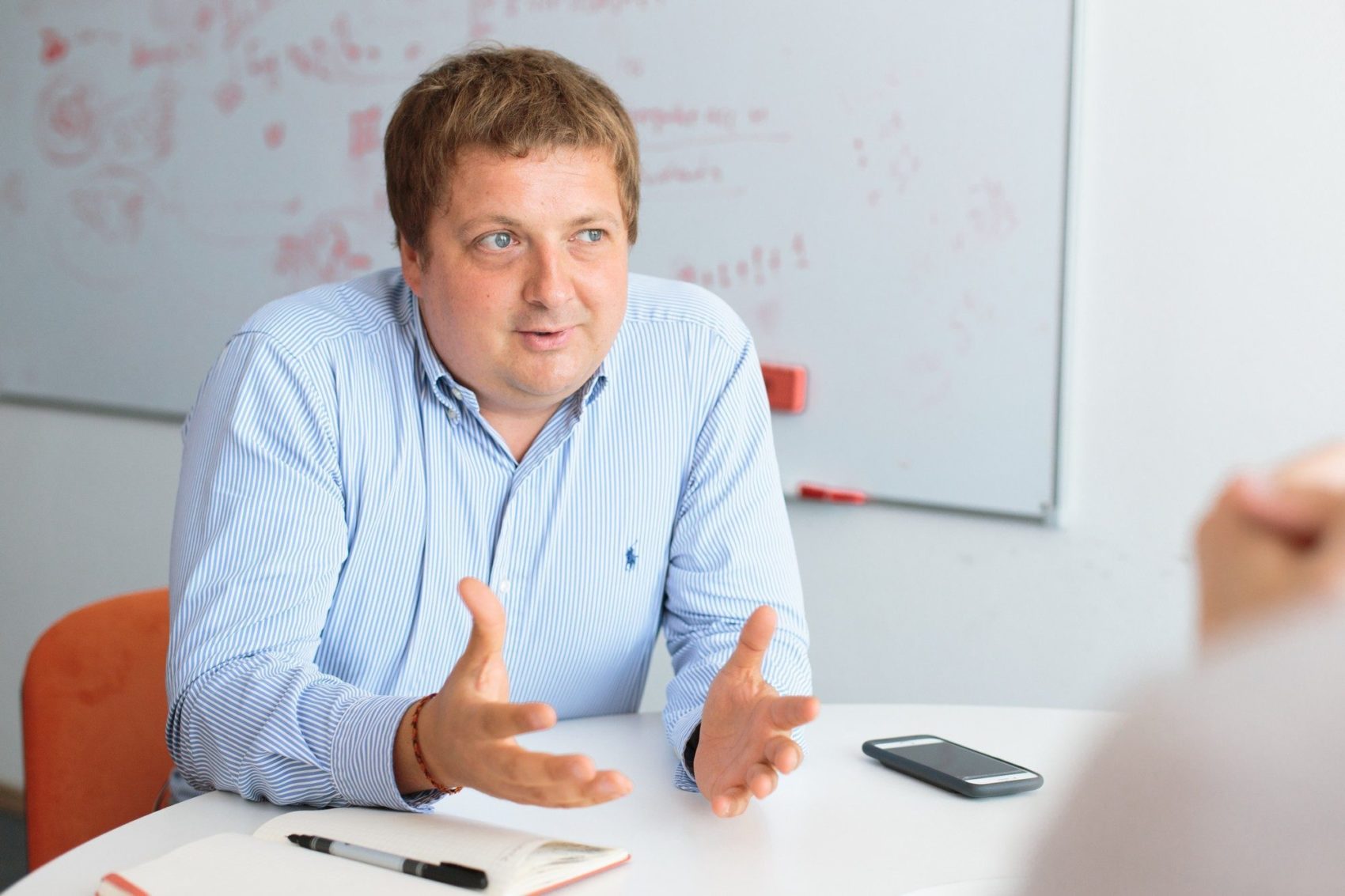
Більшість тих автомобільчиків робили зі шкільного зошита. А я купив картон, фломастери, робив кращі авта і розфарбовував їх під вигляд різних іномарок. Продавав їх по 5 копійок за штуку. Вони зазвичай переганяли простіші. На жаль, вчителька перших класів оцінила мою ідею негативно і мій бізнес закрили. (Усміхається)
Друга спроба була в університеті. Ми з колегою організовували дискотеки на день першокурсника для студентів інших факультетів — юристів, міжнародників та інших. Це був шанс проявити себе.
Далі була перша компанія, в яку влаштувався найманим працівником, — нашим завданням був продаж системи та встановлення програм, які давали змогу отримувати інформацію про інші компанії. Я ходив по різних фірмах, пропонував їм систему і встановлював оновлення. Тоді мені вдалося продати систему підприємству «Світанок», яке спеціалізувалося на продажі скла. Це було круто, бо в процесі я спілкувався з директором компанії, хоча сам був третьокурсником. Таким був мій перший досвід продажів B2B.
Наприкінці четвертого курсу, у 1998 році, я влаштувався у компанію, що займалася програмуванням. Університетська освіта тоді не давала потрібних навичок, тож коли з’явилася можливість такої роботи, я впродовж усього літа самостійно вивчав мову програмування Visual Basic.
Зараз часто можна почути термін «серійний підприємець», і у вас ця підприємницька жилка чітко простежується. Чотири роки ви пропрацювали в цій компанії, і у 2001-му з’явилася ідея створення своєї, правильно?
Так. Пропрацював там десь чотири роки, і ми робили доволі цікаві проекти. Наприклад, розробляли програмне забезпечення для BMW — брали участь у розробці ручки для управління комп’ютером. Згодом вона з’явилася майже в усіх автомобілях BMW.
Потім виникло бажання робити щось своє. Я зрозумів, що не можу бути просто найманим працівником, — хотілося брати більше відповідальності на себе, боротися з ризиками та викликами. Врешті-решт, і фінансовий аспект також був важливим.
Почав шукати інші можливості, навіть думав про переїзд до Києва або в інше місто. Тоді я не знайшов пропозицій роботи, але знайшов пропозиції партнерства. З’явився німецький партнер, у якого була ідея розробки програмного забезпечення під Novell. Він був власником невеликої компанії з інсталяції програмного забезпечення для Novell. В Україні він шукав однодумців, які разом із ним могли б зробити софт для продажу.
Після кількох зустрічей ми вирішили працювати разом. Потім, коли я побачив, що справа не надто швидко рухається, а німецький партнер «пробуксовує», я взяв на себе ініціативу та запросив свого колегу — Дмитра Косарєва. Відтак вже втрьох ми заснували компанію, яка називалася Novellix. Цей процес зайняв кілька місяців, адже ми почали розмову навесні 2002 року і офіційно стартували 8 серпня 2002 року.
Ми орендували маленьку кімнатку на двох в приміщенні USAID, де почали розробляти програмне забезпечення. Напрямки в розробці показав наш німецький партнер. Офіс, де ми орендували приміщення, працював із 9 до 21, і ми також працювали у такому ритмі. Нам швидко вдалося створити декілька прототипів, які об’єднували Linux та Novell. Зараз компанія Novell фактично не існує, але на той час вона була доволі відомою і навіть «тягалася» у деяких розробках із Microsoft.
Цього року N-iX виповниться 15 років. Наскільки легко було розвивати компанію?
Так! Ми дуже швидко досягли успіху. Напевне, це через велику кількість енергії та вдачу всіх партнерів. Ми збільшили нашу команду до десяти людей, і вже у березні 2003 року всі наші технології купила компанія Novell.
Там, до речі, дуже цікава історія. Першими з нами сконтактували їхні юристи, тому що у назві нашої компанії — Novellix — ми частково використовували їхню. Через це про нас почали говорити на рівні топ-менеджменту тієї компанії. Віце-президент Novell побачив, що ми робимо, йому сподобалося, і він одразу ініціював процес купівлі нашої компанії.
Спершу вони хотіли повністю викупити компанію, але ми вирішили, що це не потрібно. Продали їм технології і отримали довгостроковий контракт на подальшу розробку разом із командою в Novell. Відтак перейменували компанію в N-iX. При чому у логотипі «N» замість червоної зробили помаранчевою, а «iX» залишився сірим, як це й було в попередній назві.

Таким чином, Novell став нашим першим клієнтом, з яким ми уклали дуже хороший контракт. Завдяки цьому компанія збільшилася до 30-40 працівників, було також кілька менших клієнтів.
Другим нашим великим клієнтом став той самий віце-президент із Novell. Він перейшов на позицію СЕО у шведську компанію StreamServe. Вони закривали офіс в Індії і шукали нову локацію для розробки інженерних сервісів, тож він порекомендував своїй команді почати працювати з нами. Так ми стали їхнім партнером.
Ці дві компанії впродовж доволі довгого періоду були нашими основними клієнтами. Ми стрімко з ними розвивалися, на проектах від StreamServe у нас в якийсь момент було майже 60 людей, загалом в компанії тоді працювало майже 100 працівників.
Ми вважали, що це успіх, і доволі довго існували в такій чисельності. Німецький партнер став пасивним, тому ми викупили його частку в компанії. Відтак я став мажоритарним акціонером компанії.
Поки все це відбувалося, компанія не зростала. Після викупу частки у нас з’явилися нові ризики — зокрема, ймовірний відхід одного з наших великих клієнтів. Ми також пробували робити власні продукти: інвестували дуже багато своїх коштів, але це був не надто вдалий досвід. Треба було приймати чіткі рішення. Я активніше взявся за управління, і за останні п’ять років компанія збільшилася у 6 разів — до 700 працівників. Ми активно почали займатися розвитком бізнесу, і нам це доволі успішно вдається.
За час поки N-iX розвивався не дуже активно, я займався своїми стартапами. Деякі з них існують досі. N-iХ — наразі найуспішніший з фінансової точки зору. (Усміхається)
Першим був G-Recorder — продукт, який давав змогу записувати скайп-розмови і скайп-чати на Gmail. Роки два я ним займався паралельно з N-iX. Проект не став ні успішним, ні збитковим, ми навіть отримали невеликий прибуток. Але потім Microsoft викупив Skype, і не було сенсу розвивати цей продукт, бо у них він також був.
Другим стартапом, про який говорили вже більше, був ThickButtons. Ми його робили разом із Дмитром Лисицьким, одним із співзасновників GlobalLogic. Технологія та ідея була доволі проста — на екрані мобільного телефону кнопки збільшуються або зменшуються в залежності від того, що ти набираєш. Ми розробили цю технологію і потрапили в активну хвилю запуску Android. Презентували її в Каліфорнії на конференції, найняли дуже класну каліфорнійську PR-агенцію, яка на основі цього пітчу організувала дуже багато контактів із журналістами. Ми отримали майже 70 публікацій у доволі відомих виданнях — Wired, PC World та інших, навіть у Discovery Channel.
На якому етапі цей стартап зараз?
У технологічному бізнесі часто з’являються «вікна можливостей», коли твоя технологія може бути потрібною. Світ дуже швидко змінюється, тому зазвичай є дуже мало часу для того, щоби довести цю технологію до ладу та перетворити її на бізнес. Якщо ж ти недостатньо фокусуєшся на цьому «вікні можливостей», то бізнес зробити не вдасться. У нас воно було і ми в нього потрапили.
Ми хотіли розвинути цю технологію, тож запатентували її. Відтак планували ліцензувати її виробникам мобільних телефонів. Зустрічалися майже зі всіма наймасштабнішими виробниками, та найбільше ідеєю зацікавилися корейці — Samsung та LG.
Але на той час Samsung вже домовився з компанією Swype. Вони навіть почали маркетингову кампанію, тож ми їм стали нецікавими.
Залишилася LG. Ми зустрічалися в Каліфорнії з одним хорошим венчурним фондом. Тоді вони нам заявили відверто: «Хлопці, ви нам нецікаві, тому що будуєте маленький бізнес. Найбільше, чого ви можете досягти, — компанія з оцінкою у 100 млн доларів. Але ми знаємо людей із LG, давайте познайомимо вас». Це типово каліфорнійський підхід.

Далі в нас була зустріч із LG. Ми презентували технологію — і згодом поїхали у Південну Корею працювати над цим продуктом та обговорювати контракт. Наступного року LG планували створити 10 мільйонів телефонів, а ми мали отримати по 5 центів за ліцензію з кожного девайсу. Ми працювали над цим впродовж усього літа і навіть подумували про те, щоб продати їм ексклюзивність. Фактично, це був момент, коли корейські виробники вийшли на ринок і стали гігантами індустрії. І це їм вдалося завдяки Android.
Однак тоді на перепоні нам стали зовнішні чинники. Не домовившись із Samsung, Microsoft вирішили зосередитися на LG. Останні докорінно змінили свою стратегію і вирішили, що отих 10 мільйонів телефонів, які спершу планували випустити на Android і де мала бути встановлена наша технологія, вони випускатимуть на Windows Mobile. І Microsoft заплатив їм за це близько 300 мільйонів доларів.
Та Windows Mobile виявився неуспішним, а LG на рік втратила ринок. Звісно, потім вони повернулися до платформи Android, але через рік touch-screen стали набагато якіснішими, а проблема, яку ми вирішували, — не настільки гострою, як до того. Після цього ми стали значно менше часу присвячувати розвитку компанії. ThickButtons далі існує, додаток можна завантажити, але window of opportunity ми вже втратили. Благо, я ніколи не полишав N-iX.
Чи вважаєте ви, що часто якість проектів і продуктів з’являється з великої кількості?
Важко відповісти. Нашого першого успіху з Novell ми досягли доволі швидко і без великої кількості проектів перед ним. Нас одразу купили. Це було прикольно. (Усміхається)
Якщо прочитати книжку Лінуса Торвальдса про Linux, то він також описує, як Novell хотів його купити, власні враження від приїзду в ту велику компанію, і як вони з ним спілкувалися. Його спогади дуже схожі на наші — нас всі також дуже любили. Великі компанії — особливо ті, які вже вмирають, — дуже люблять талановитих підприємців, бо це їхній шанс отримати нове дихання.
Досвід попередніх проектів допомагає побудувати більший бізнес та одразу бачити більше можливостей. Навіть із кількома не надто успішними проектами за плечима навчаєшся краще прораховувати ходи і робити менше дурниць
Досвід попередніх проектів допомагає побудувати більший бізнес та одразу бачити більше можливостей. Навіть із кількома не надто успішними проектами за плечима навчаєшся краще прораховувати ходи і робити менше дурниць. З іншого боку, той-таки досвід, найімовірніше, і заважає зробити ті «дурниці», які потрібні для успішного проекту. Але що більше ти робиш, то краще розуміння ринку, стратегій та бізнес-моделей матимеш.
Я дію радше інтуїтивно, аніж раціонально, і мені важко сказати, звідки ця інтуїція береться. Я і тепер маю декілька цікавих ідей, але наразі вирішив сфокусуватися на N-iХ.
Компанії вже 15 років, хочеться зробити її ще більшою і ступити наступний крок — наприклад, створити можливості для виходу на IPO. І це, до слова, хороша амбіція, бо наразі немає жодної української аутсорсингової сервісної компанії, яка вийшла б на IPO.
Чи ви інвестуєте у стартапи?
У всі попередні проекти я інвестував — був співзасновником та вкладав власні кошти. В перший проект IM-history я просто інвестував, але потім зрозумів, що так не можна. Моїми партнерами були програмісти, які більше хотіли писати код, тому я був співзасновником і займався бізнес-девелопментом. Найцікавіше, що ідею, як кінцево почати заробляти гроші, тоді придумав не я, а Сергій Газієв. Втім, я намагався знайти інше фінансування, провести компанію стандартним шляхом стартапу. В ThickButtons я теж інвестував, але був радше партнером.
Також я інвестував у gaming. У студію ZadZen Games я не лише вклав кошти, а й був активним бізнес-ангелом. Я не з тих, які дають гроші і взагалі не слідкують за розвитком.
Також пробували розвивати компанію Unshared.tv — персоніфікований телеканал для Facebook. Це було в 2010 році, саме тоді Facebook випустив Social Graph. Але ми закрили свою компанію швидше, ніж Social Graph. Як виявилося, правильно зробили, бо вона і так померла б. Це одна з небезпек: коли ти намагаєшся побудувати свою бізнес-модель на одному із гігантів, то він дуже швидко починає це розуміти і однією дією може усе припинити.
Остання моя інвестиція була на хакатоні Garage48. Я вирішив долучитися та подвоїти суму первинних інвестицій в проект GoBuddy. Це продукт, що поєднує в собі fin-tech та insur-tech у форматі chatbot-месенджера, орієнтованого на міленіалів. Ідея GoBuddy має всі критерії для успіху на глобальному ринку, оскільки пропонує послуги страхування в новому форматі для цільової аудиторії, яка часто не задумується про необхідність в цьому продукті.
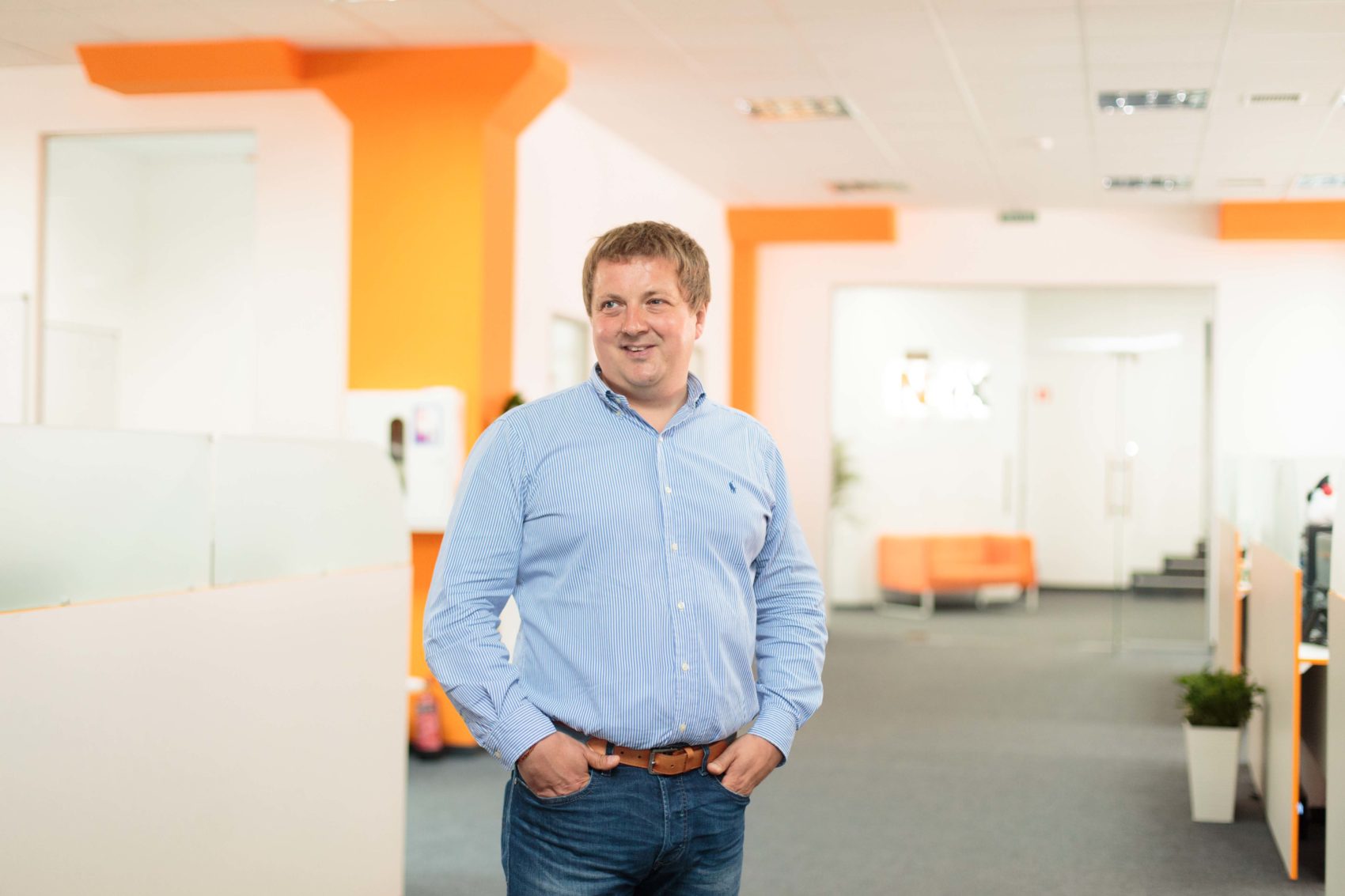
Плануєте займатися інвестуванням ще активніше?
Для мене набагато цікавішою є модель активного занурення в компанії, у які я інвестую. Якщо дивитися з позиції лише інвестора, то я можу це робити. Можу інвестувати суми в межах кількадесяти тисяч доларів, якщо мені дуже подобається ідея, команда і проект. Я спілкуюся з колегами і планую інвестувати туди, куди й вони, долучатися. В принципі, зараз є можливості.
З’являється все більше компаній, куди можна вкласти кошти. Але це радше таке собі інтелектуальне казино — ти інтуїтивно приймаєш рішення, бо відчуваєш якийсь тренд.
Ми інвестували в декількох клієнтів N-iX, бо віримо у їхній продукт. Зараз ми долучилися до однієї цікавої компанії, яка займається розробкою тренера для американського футболу на основі VR-технологій, зокрема motion tracking.
Це серйозна розробка, і виглядається, що вони роблять унікальне і цікаве рішення на ринку. Ми погодилися інвестувати в них своїми сервісами, і тепер у всіх інтерв’ю вони згадують про нас як про партнерів. Це швидкі переваги, які цікаві для N-iХ, але у перспективі можна отримати набагато більше.
Але неможливо брати активну участь у, наприклад, 20 проектах. Наш час обмежений, тому важливо фокусуватися на чомусь одному.
Так. Напевно, є дві головні моделі, які можна використовувати. Перша — інвестувати більше коштів у меншу кількість компаній і якомога активніше вникати у процес, друга — інвестувати в, наприклад, 100 компаній по 10 тисяч.
Часто люди люблять називати себе інвесторами, зараз це модне словечко. Я інколи вкладаю маленькі ангельські інвестиції, але не називаю себе бізнес-ангелом. Для мене це радше дороге хобі
Часто люди люблять називати себе інвесторами, зараз це модне словечко. Я інколи вкладаю маленькі ангельські інвестиції, але не називаю себе бізнес-ангелом. Бо ангельські інвестори — це люди, які займаються інвестуванням дуже системно. Для мене це радше дороге хобі. Завдяки цьому я отримую спілкування з новими людьми і допомагаю розвиватися іншим.
Повертаючись до проекту, який рухався паралельно із розвитком компанії, — ZadZen Games. Як він зараз розвивається?
Це окрема студія, зараз вони активно працюють. Ми зробили один ігровий продукт, і, в принципі, він був майже успішним — отримав три мільйони завантажень і став грою року в цій категорії у Південній Кореї.
Але ігри «free to play» — одні з найскладніших продуктів. Користувачам має бути цікаво, вони мають бути щасливі, і в певні моменти вони повинні відчувати біль, щоби стати готовими платити. Це складна модель монетизації.
Наприклад, у нашого продукту класна графіка, у нього цікаво грати, але фінансові показники не виходили на прибутковість. У цій сфері потрібно розуміти, що у гейм-бізнесі ти занурюєш людину у віртуальний світ, і там ти повинен створювати такі емоції, щоб користувач готовий був платити. Гра не вирішує якоїсь проблеми, як, наприклад, софт, але вона має спочатку зробити тебе щасливим, щоб ти нею захопився, а потім нещасним, щоб ти не міг пройти якогось рівня, але хотів грати далі. У геймінгу важливо, щоб процес викликав емоції, а це складна модель монетизації.
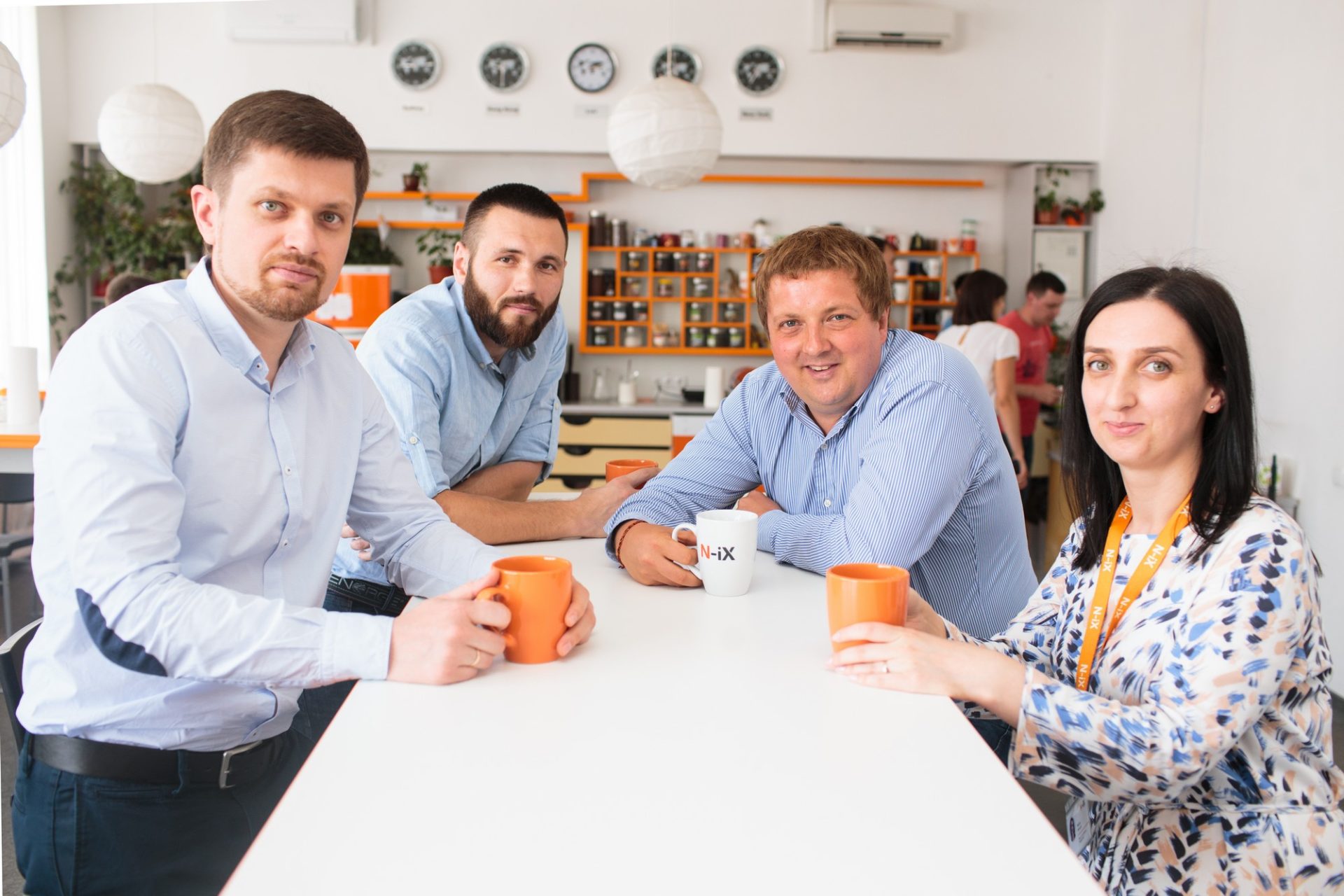
Втім, у цій справі я більше інвестор. Мій партнер, який управляє студією, живе зараз в Америці. Тож він каже, що в іграх люди платять за гріхи. Вони лінуються і хочуть заплатити. Або якщо хтось інший переміг, то вони хочуть помститися. Це складно.
Ця студія зараз розвивається, і вона має фіксовану модель. Ми надаємо сервіси для інших студій та робимо декілька нових продуктів, які, сподіваюся, стануть успішними. Цей бізнес самоокупний, і за чотири роки ми вже багато чому навчилися.
Якщо дивитися на якісь дуже успішні продукти інших студій, то можна побачити, що вони десь 100-150-ті по рахунку серед усіх. Тобто компанії дуже багато експериментували перед тим, як досягли успіху. В іграх правило «якість з’являється із кількості» точно працює.
Для мене ця інвестиція досить цікаво спрацювала ще й з тієї точки зору, що коли в нас гра не вийшла в студії, то декілька людей вирішили піти, і дехто з них зараз працює в N-iХ. Тут маємо свій напрям game development, свої продукти, розвиваємо VR-gaming.
N-iX працює у багатьох індустріях: gaming, VR, fintech, healthcare, aviation та інших. Які напрями пріоритетні?
У нас багато різних напрямів, бо є запит від клієнтів і у нашій команді є відповідні експерти. У деяких напрямах ми розвиваємо нові компетенції та власний R&D, бо якщо це трендова тема, то на неї буде попит як серед існуючих, так і потенційних клієнтів.
З 15-річним досвідом і людьми, які в нас є, ми є хорошим партнером для компаній, які шукають можливості для digital-трансформацій. Це величезний тренд, який уже зараз простежується у багатьох індустріях.
У кінці 2014 року я тиждень провчився на executive-курсі у Singularity University. Це інституція, яка пропагує всі інноваційні тренди і добре їх аналізує. За нею стоять великі футурологи, як-от Реймонд Курцвейл. Вони намагаються нести в маси ці знання.
Там я багато почув про нові тренди і отримав розуміння, куди все буде рухатися: що активно розвиватиметься fintech і blokchain, що automotive трансформуватиметься у self-driving, що все інноваційнішою ставатиме agriculture, що відбудеться багато змін у логістиці і т. д.
Це, напевно, стало поштовхом для драйву нашої компанії. Ми намагаємося розуміти ті тренди, які з’являються в інноваційному світі, та розуміємо, що ми є хорошим освітнім партнером для тих компаній, які цих знань не мають.
Ми намагаємося розуміти ті тренди, які з’являються в інноваційному світі, та розуміємо, що ми є хорошим освітнім партнером для тих компаній, які цих знань не мають

Коли агрокомпанії, наприклад, мають багато даних і хочуть увійти в data science, machine learning чи computer vision, то ми знаємо, як їм у цьому допомогти. Їм треба аналізувати дані і на їхній основі приймати рішення. Ми розуміємо, що потенціал цієї індустрії великий, в нас навіть з’явилися перші клієнти, відповідно, в нас ця індустрія відображена на сайті.
У fintech у нас велике портфоліо, і це один із наших головних напрямів. Game development і virtual reality — це також цікаві напрями для нас. Gaming — це окремий світ, але якщо дивитися на virtual reality, то ми розуміємо, що «вікно можливостей» у цій технології закриється, може, навіть і наступного року.
Чи могли б ви розповісти про найцікавіші, на ваш погляд, проекти компанії?
Одразу можу згадати той-таки VR. Цей тренер для американського футболу — один із наших найінноваційніших проектів.
Проблемна ситуація там полягає у тому, що тренування квотербеків в американському футболі є дуже дорогим. Для того, щоб він тренувався, має бігати вся команда. Він не може тренуватися самостійно, і це створює дуже велику проблему. А віртуальна реальність дає йому можливість тренуватися, а тренеру створювати для гравця різні ігрові ситуації.
Фактично, це як комп’ютерна гра, але сценарій прописаний тренером. Він буде в кімнаті кидати умовного м’яча зі всією силою, а програма вираховуватиме всі показники так, наче ця ситуація відбувається на полі. Це дає змогу тренувати гравця без залучення всієї команди.
Конкретна проблема, яку вирішує ця інноваційна технологія. Там налаштований motion tracking, гравець одягає спеціальний костюм. Не знаю, скільки воно коштуватиме, — напевно, декілька десятків тисяч доларів, — але технологія точно заощаджуватиме більшу частину коштів.
Ще один цікавий інноваційний проект — Digital Pen. Компанія розробила технологію для електронної ручки, яка пише по папері, запам’ятовує усе написане і може передавати на комп’ютер. Ми давно працюємо з цією компанією і є їхнім технологічним партнером. Ми пишаємося цим продуктом.
Зараз ми працюємо із Gogo, яка є однією з лідерів inflight internet у США. Це компанія, яка надає інтернет всередині літаків. Вони стали партнером Airbus, і Airbus пропонує їхню антену як опцію в літаках. Якщо якась компанія хоче надати інтернет в своєму літаку, то може встановити Gogo. Це цікавий проект, бо якість інтернету в літаку залежить від погодних умов, рельєфу землі і від багатьох інших факторів. Ми працюємо з аналітикою: літак летить, і ми в режимі реального часу аналізуємо всі дані і дивимося, скажімо так, куди в цей момент має підключатися антена.
Іншим нашим клієнтом є великий телеком-провайдер із Великої Британії, з яким ми розробляємо дуже багато продуктів. Робимо для них великий digital transformation product package. Це компанія, яка продає sim-карти для дзвінків додому, тобто вони орієнтовані на емігрантів у Великій Британії. У них є ціла лінійка продуктів, орієнтованих на потреби емігрантів.
Ми з цим клієнтом почали працювати з огляду на наш досвід у сфері fintech. Перший продукт, який вони хотіли розвивати, — це перерахунок грошей. Це логічно, бо емігранти часто хочуть перераховувати кошти додому. А якщо вони вже мають акаунт цієї компанії у телефоні, то можна робити це не через банк, а через них. Ми робили це рішення.
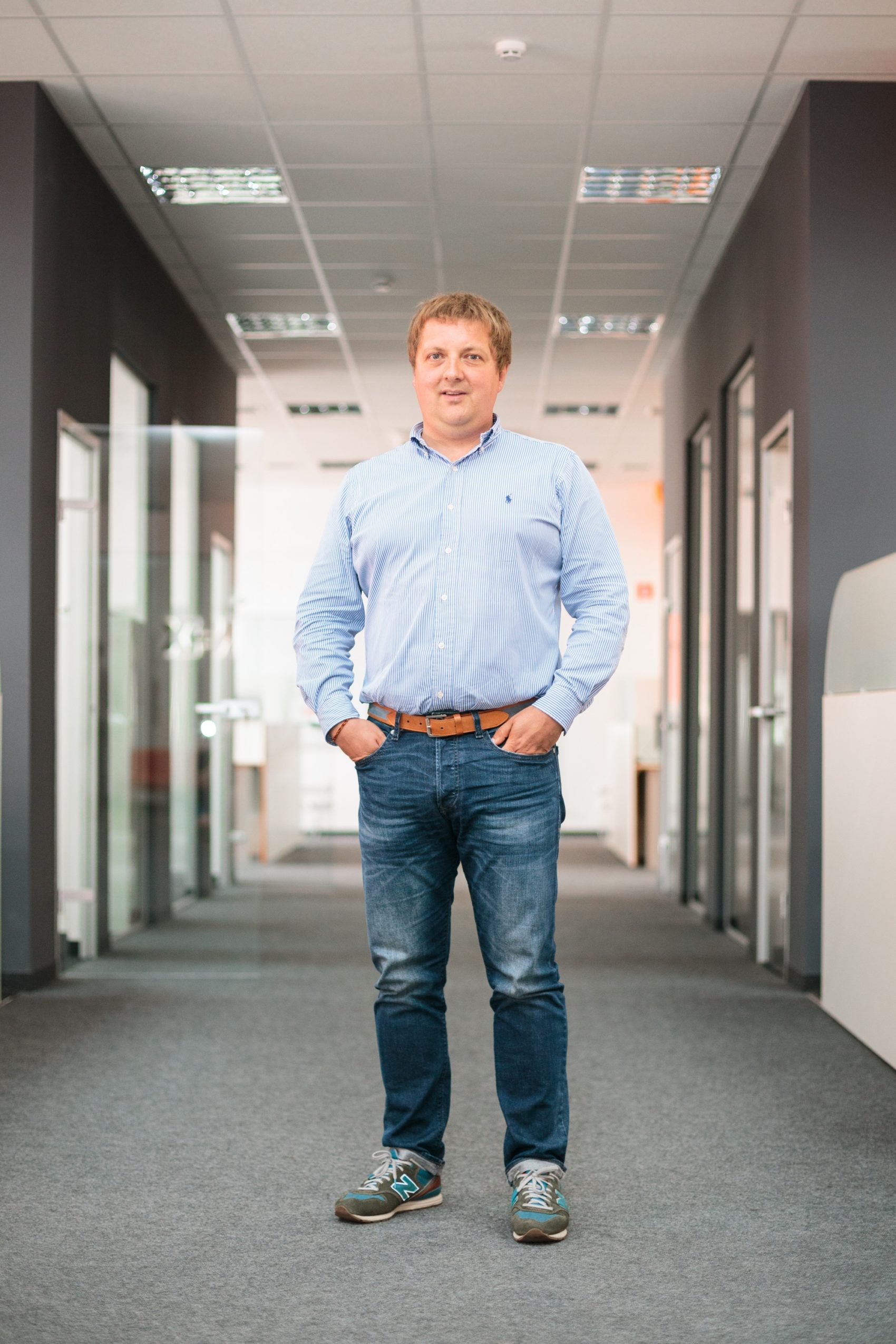
Друге рішення — страхування. Цей проект технологічно не є якимось фантастичним, але важливим, бо компанію у Британії всі знають. Згідно з результатами досліджень, до 2020 року у світі має бути 1 мільярд мігрантів, і вони ставлять собі за мету стати основною телеком-компанією для цієї аудиторії.
Ми зараз працюємо над залученням клієнтів зі сфери automotive. Розвиваємо цей напрям, будуємо R&D і хочемо працювати з такими клієнтами. Це великий тренд останніх років, і ми впевнені, що можемо із ними працювати.
Опишіть, будь ласка, людський капітал компанії. Яким є типовий працівник компанії N-iX?
Типовий працівник N-iX — розумний та амбітний. Він добре вміє аналізувати та приймати рішення, які здатні привести його до успіху. Як з матеріальної позиції, так і з погляду особистісного розвитку. Принаймні в компанії ми намагаємося забезпечити усі умови для зростання. Але знову ж таки, N-iX — це не безкінечні «плюшки». Наше завдання — створити умови: цікаві проекти, безпосереднє спілкування із замовниками, достойна зарплатня, розвинені компетенції, фахові колеги, з якими хочеться працювати і обмінюватися досвідом. Хто розумний — скористається цим. А під лежачий камінь вода не тече.
Всього у компанії зараз працює близько 700 фахівців. Більшість — 550 осіб — у львівському офісі, понад сотня — у київському. Ми вже 24-ті за розміром в Україні і в нас є амбіція увійти у топ-10 українських компаній до кінця 2018 року. Окрім цього, маємо ще невеличкі команди у США, Швеції, Польщі та Білорусі.
Чітко розуміємо, що будемо активно збільшувати кількість працівників в Україні, оскільки бачимо тут велику перспективу. В Мінську маємо свій delivery centre і також розглядаємо це місто як хорошу локацію для розвитку.
Також плануємо і Європу, але якщо порівнювати кількість талантів, які тут є, і приріст індустрії, то Україну дуже важко порівнювати з країнами Європи…
Тобто у нас їх більше?
Так. У нас багато талантів і дуже багато людей вчаться для того, щоб потрапити в ІТ-індустрію. Технологічна сфера у нас зараз дуже популярна і постійно промоціюється.
Впродовж останніх двох років я також є головою наглядової ради Львівського ІТ Кластера, тому чудово розумію усі ті тренди. Зараз в країні є 130 тисяч ІТ-спеціалістів. Мета — 200 тисяч до 2020 року. У Львові зараз працює 18 тисяч спеціалістів, і ми хочемо збільшити цей показник до 30 тисяч у 2020-му. Не знаю, чи це вдасться, але ставимо собі таку ціль.
ІТ-тренд у країні дуже швидко розвивається. Багато людей хочуть почати працювати в ІТ, з’являється багато навчальних програм… Це наша перевага у порівнянні з європейськими країнами, тому що там є інші можливості. А у нас для багатьох інженерів це чудова нагода знайти хорошу й гідну роботу.
У одній із попередніх розмов спецпроекту ми вже згадували про те, що ІТ-сфера створює хороші соціальні ліфти для освіченої й проактивної молоді. І якщо колись була «мода» на економіку, право та міжнародні відносини, то тепер найперспективнішими є саме ІТ-спеціальності. Як ви вважаєте?
Повністю погоджуюся. Шість років тому у Львові відбулася перша конференція TEDxLviv. Нам із Михайлом Лазором запропонували виступити. Ми почали думати над темою, перечитали концепцію проекту, зрозуміли, чим є TED, і запропонували просту ідею, яка, на нашу думку, була вартою поширення: «Іди в IT». Дуже проста ідея, яка в Україні точно мала великий соціальний вплив.
Часто, коли мене запитують про соціальну відповідальність компанії, то я кажу так: «Те, чим ми займаємося, — це вже велика соціальна відповідальність». Те, у якому робочому контексті живуть і працюють наші працівники, добряче впливає на соціум. Вони керуються іншими цінностями, вони дуже багато спілкуються, працюють з іноземцями, вчаться по-іншому вести бізнес й мають іншу бізнес-етику.
Як жартує один мій знайомий: «У сім’ях ІТ-спеціалістів ніколи не народиться «мєнт» чи митник». Також там ніколи не народиться корупціонер. І вже це велика соціальна місія!
Як жартує один мій знайомий: «У сім’ях ІТ-спеціалістів ніколи не народиться «мєнт» чи митник». Також там ніколи не народиться корупціонер. І вже це велика соціальна місія! (Усміхається) Що більше працівників у таких компаніях буде, то помітнішими будуть зміни і відчутнішим вплив. Не обов’язково це мають бути ІТ-спеціалісти. Тут можна говорити і про маркетологів, і про HR-ів, і про інших.
Але цей «соціальний ліфт» — дійсно дуже помітний і дуже швидкий. Він створює можливість для того, щоб за допомогою свого мозку і рук доволі швидко заробити грошей, які у інших сферах навіть корупційними шляхами треба буде заробляти довше.
Працівники сфери ІТ думають не про корупційні можливості, а про розвиток — шукають нові вміння, беруть участь у конференціях і т. д. Вони формують креативний клас і самі є споживачами продукції креативного класу. І, таким чином, змінюють свої середовища. Вони мають достатньо коштів, бо споживають креатив. У Дубліна — дуже схожа історія. Він став креативним містом після приходу великих технологічних компаній.
Тому якщо знову говорити про соціальну місію, то ми формуємо основну масу локальних споживачів продукції креативного класу. Вони хотітимуть креативних підходів у ресторанах, у роботі, у відпочинку.
Один із негативів, з якими часто стикаємося, — це невміння домовлятися і знаходити консенсус. Це стосується і медіа, і часто громадянського суспільства, і політики… Львівський ІТ Кластер у цьому випадку є нетипово позитивним кейсом. Як починалася історія кластера і наскільки вам вдається зараз працювати на win-win?
Львівський ІТ Кластер — один із хороших прикладів домовленості, заснованої на принципі win-win. SoftServe та Eleks долучили нас до ініціативи створення кластера, і компанія N-iX стала його третім учасником-засновником.
Домовлятися легко, коли є спільне бачення майбутнього. Нам легше домовлятися щодо майбутнього, ніж щодо теперішнього. Ми добре розуміли, що усі місцеві львівські компанії обмежені у людському капіталі. Що більше є талановитих ІТ-спеціалістів у місті, то легше компаніям зростати. Так, інколи між собою ми конкуруємо за клієнтів, але найчастіше — за таланти.
Діяльність кластера не спрямована на business development, і це не є асоціація, яка допоможе нам розвивати спільний бізнес. Звісно, якби з’являлися якісь глобальні проекти, для яких потрібно залучати дуже багато спеціалістів, то цілком можливо, що кластер може стати основою для його реалізації.
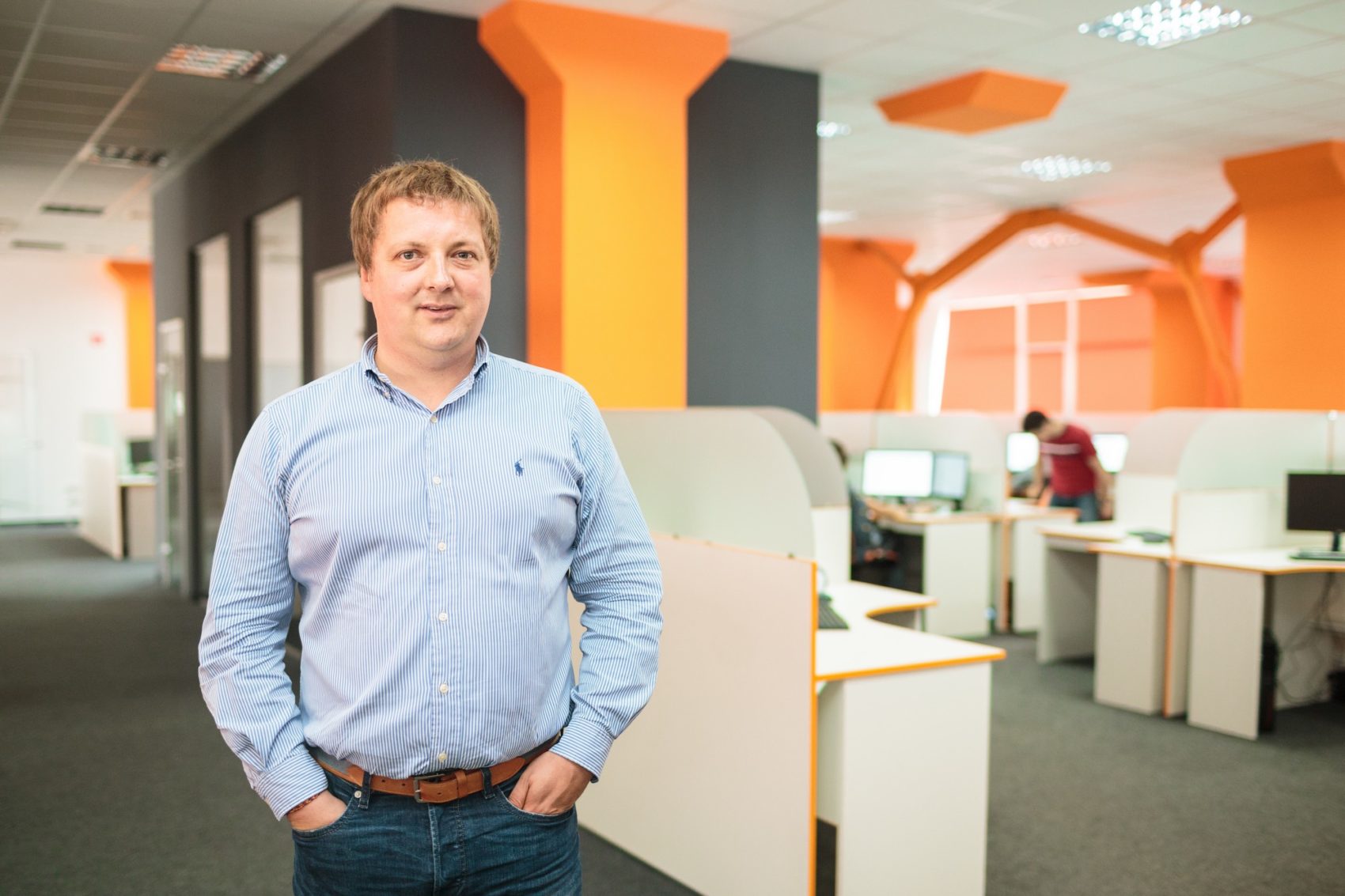
Але коли ми розпочинали цей проект, то була проста ідея — розвитку людського капіталу у місті. Так, кожна компанія могла б це робити окремо, але ми чітко розуміли, що спільні зусилля будуть набагато ефективнішими. Перед нами чітко постала потреба у модернізації місцевої ІТ-освіти і пропагуванні ідеї ставати програмістами.
Ми колись аналізували conversion rate. У Львові є хороші школи з високим рівнем викладання математики. У цих школах є випускники з чудовими оцінками з математики. Ми намагалися зрозуміти, скільки цих випускників шкіл продовжували навчання на факультетах, які навчали програмістів, і скільки з випускників профільних факультетів стають програмістами після закінчення університетів. Тоді з’ясувалося, що 10% випускників університетів далі працювали за спеціальністю. Зараз цей показник сягає приблизно 50%.
Далі в ІТ був бар’єр, який стосувався рівня англійської мови. Тому одним із перших кроків кластера було впровадження курсів англійської мови в університетах. Ми розуміли, що мусимо донести до студентів обов’язковість володіння іноземною мовою. Бо це одна із перепусток у професію.
Розвиток освіти і людського капіталу — основна місія кластера. Багато компаній бачить у цьому свою соціальну відповідальність.
У нас конкуренція не між собою, а з потенційними конкурентами — більшими компаніями, які незабаром можуть прийти
Також ми активно працюємо зі школярами. Впродовж року ми відвідали 80 шкіл: 50 у Львові і 30 — в області. Обираємо навчальні заклади відповідно до оцінок, які отримують школярі на ЗНО з математики. Якщо у школі є хороші оцінки з математики, то є потенціал, і ми заохочуємо їх розвиватися. Всі, хто добре вчаться, автоматично стають хорошими кандидатами для роботи у нашій індустрії.
…Програмісти, які вже працюють у ІТ-сфері, повинні відчувати себе потрібними у місті. У Львові вони мають почуватися комфортно. Важливо, щоб вони залишалися у місті, а ще краще — заохочували друзів приїжджати сюди. Тому створюємо різноманітні проекти, які покликані підвищувати якість життя.
Наприклад, IT Jet, пов’язаний із фасилітацією перельотів. Щойно у людини зростають доходи, вона стає набагато мобільнішою. Специфіка професії дає змогу їй працювати з будь-якої точки світу. Для того, аби втримати цей людський капітал, ми ініціюємо такі проекти. Це ще одне завдання — розвиток і втримання людського капіталу в місті.
Оця місія та завдання дозволили нам домовитися. У нас конкуренція не між собою, а з потенційними конкурентами — більшими компаніями, які незабаром можуть прийти.
Наскільки важливою у цьому процесі є специфіка Львова? Знаю, що є ІТ-кластери й у інших українських містах, але, наскільки розумію, вони не настільки чисельні та впливові.
Перш за все, у Львові цей процес почався найшвидше.
По-друге, багато чого залежить від стратегій кластерів. Наша стратегія — дуже амбіційна. У Харкові, наскільки пам’ятаю, впродовж першого року вони вирішували безпекову проблему і існували радше як лобістська організація. У Львові не було такої потреби. Ми об’єдналися заради розвитку, і у цьому велика перевага.
Ми завжди ведемо діалог із міською адміністрацією. Інколи мені здається, що навіть занадто пасивно з нею спілкуємося.
Також робимо інфраструктурні проекти — IT Park, IT House. Вони підтверджують те, що ІТ-спеціалістів у місті поважають і заохочують їх залишатися.
А що було б, якби Львівського ІТ Кластера не існувало?
Важко сказати, якою була б ситуація у галузі без кластера. Точно добре, що він існує. (Сміється) Зараз у кластері вже більш як 60 учасників, і організація проходить етап проблем росту. Якщо зможемо зберігати таку швидкість розвитку, то буде класно.
Львів, напевне, був би типовим «середняковим» ІТ-містом. Зараз місто зазвичай займає 2 місце у рейтингу українських ІТ-міст. А з позиції привабливості працевлаштування, то, може, й перше. Кластер робить місто привабливішим і об’єднує зусилля на більших проектах.
В УКУ, наприклад, не було б програми Computer Science…
Якою є роль кластера у відкритті цієї програми?
Ми надавали свою експертизу та спеціалістів. Програма Computer Science — це програма УКУ, але багато компаній-учасників кластера надають студентам свої стипендії та підтримують цю програму.
І вона має дуже помітний вплив. Одразу після відкриття цієї програми активізувалися найбільші університети — «Львівська політехніка» та Університет Франка. І ці нові програми були відкриті не з позиції «зробіть нам!», а з позиції «допоможіть нам». Зміна оцієї парадигми у спілкуванні з університетами, напевно, стала основним досягненням цієї програми. Вони відчули, що ми нічого їм не винні, але з радістю готові допомогти.
Вірю, що якщо зберігатиметься такий темп модернізації та відкриття нових програм, то років через п’ять Львів даватиме дуже хорошу ІТ-освіту.
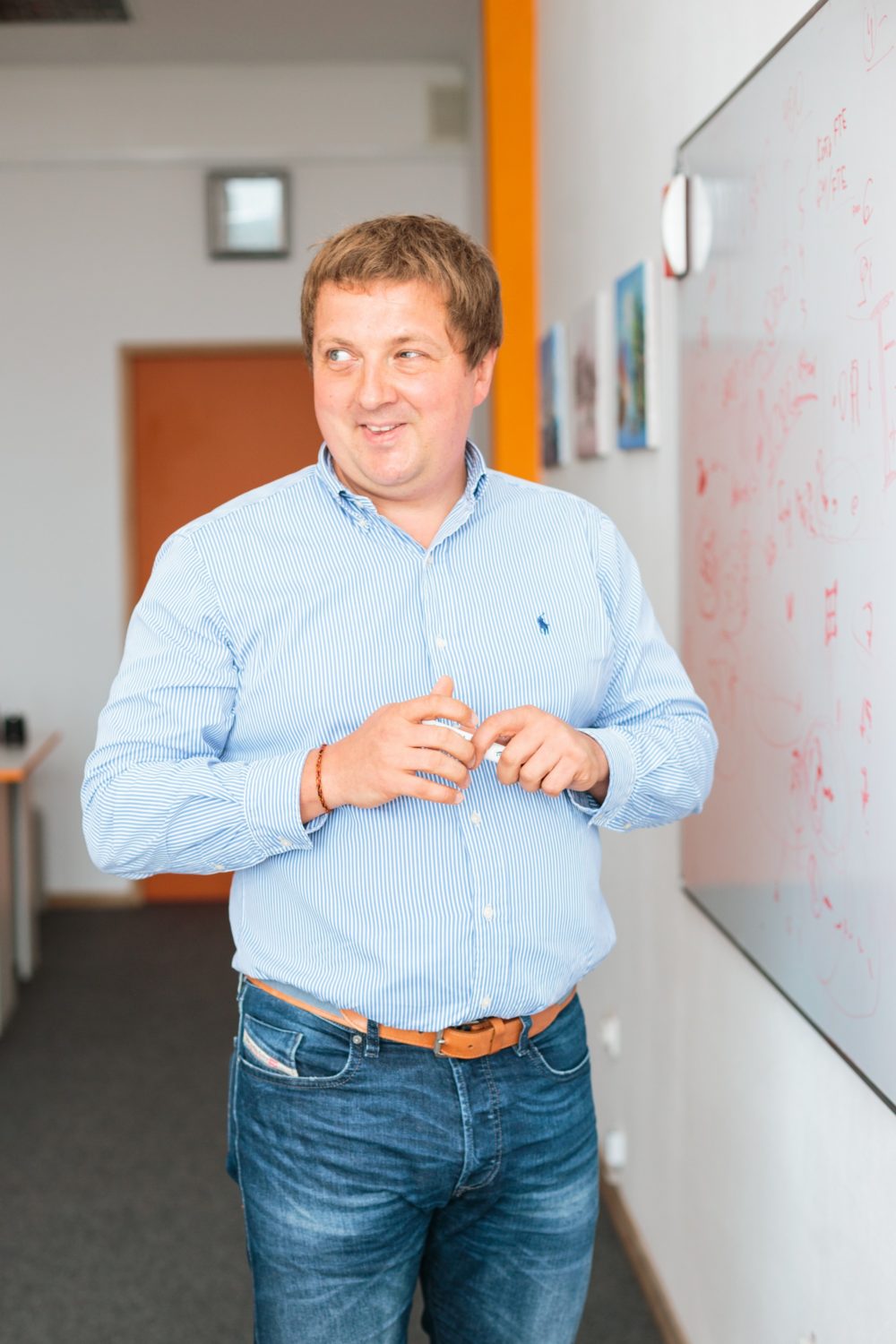
А це також важливо для втримування ІТ-спеціалістів. Бачимо, що розвиваються садочки, з’являються нові хороші школи, то університетська освіта тут поки що не дуже конкурентна. Тому коли йдеться про університет, то часто розглядають вже і освіту за кордоном. А оскільки програмісти є дуже мобільними, то навіть через освіту дитини можуть емігрувати. А це те, чого ми хочемо уникнути.
Чим для вас є успіх? Чи вважаєте ви себе успішною людиною?
Думаю, що успіх — це дуже персоніфікована річ, яка є оцінкою того, як людина реалізувала свої таланти. Якщо людина відчуває, що реалізувала те, що хотіла, і це збалансовано, то її можна назвати успішною.
Але критерії успіху різні: для науковця одні, для підприємця — зовсім інші.
Успіх — це реалізація таланту та відчуття балансу. Якщо ти маєш потенціал побудувати компанію з оцінкою у мільярд, а побудував проект на 10 мільйонів, то ти, на перший погляд, успішний. Але наче й ні. (Усміхається)
Якщо подивитися на це з позиції CEO компанії N-iX?
Я став серійним підприємцем, але вважаю, що мав певні недопрацювання щодо компанії N-iX. Якщо брати до уваги потенціал компанії і згадувати те, як ми починали, то зараз точно ми могли б бути у 5-10 разів більшими.
N-iX — успішна компанія, але я хотів би бачити її 100-мільйонною компанією. У мене є амбіція вивести компанію на IPO. Якщо це вдасться, то я тоді скажу, що компанія є успішною.
Тоді це був би справжній підприємницький успіх. У моїй моделі підприємництва і в тому, якою є ця модель у світі, успіхом є і фінансова успішність, і проекти, які вона робить. Це бізнес, і тут обов’язково треба бути успішним фінансово.
Є певні питання з моделлю успіху для підприємців. Я бачу, що рольова модель успіху, коли ти зробив себе сам, коли збудував компанію «з нуля», поки що не дуже сприймається. Підприємці намагаються не афішувати своїх фінансових успіхів, бо наразі це не є соціально прийнятно і не дуже безпечно.
Якого соціального впливу ви хотіли б досягти?
Виведення української компанії на IPO — моя ціль на наступних 5-8 років. Це амбіційна мета. І це також міг би бути величезний impact. Коли казали б, що «він зі Львова вивів компанію на IPO». Це важко, але круто. Бо зробити це із Каліфорнії набагато простіше.
Робіть все, що вам хочеться робити. Нехай великі ідеї, а не прагматичні цілі, будуть драйверами вашої діяльності. Так ви отримаєте більше щастя від життя і зможете знайти справжнього себе
Ще більше, аніж вивести компанію на IPO, хотів би повернутися у стартапи. Ми маємо план розвитку компанії до 2018 року, і є конкретна ціль, якої потрібно досягнути. Тоді треба буде приймати рішення. Якщо ми досягнемо цілі, яку собі поставили, то відкриємо «вікно можливостей» для виходу на IPO.
Бо якщо стартуєш на IPO, то на років п’ять фактично прив’язуєш себе до цієї великої організації. Я більше технік, аніж менеджер. Тому у цей момент я можу сказати, що таке майбутнє видається для мене занадто нудним і я краще робитиму virtual reality gallery для художників — і це приноситиме мені набагато більше задоволення.
Одна порада для молодих підприємців.
Робіть все, що вам хочеться робити. Нехай великі ідеї, а не прагматичні цілі, будуть драйверами вашої діяльності. Так ви отримаєте більше щастя від життя і зможете знайти справжнього себе.
Фото офісу надані N-iX.
